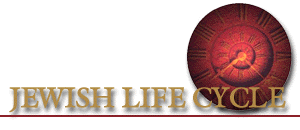 CONVERSION
CONVERSION
Orthodox:
The Jewish attitude toward conversion has changed dramatically. Although tradition required that rabbis try to
rebuff people interested in converting, today the door is wide open.
Adult conversions have the same basic requirements as the children's conversion described in the chapter
about adoptions . That means, Bris't and Mikvah immersion for men, and immersion for women. These rituals
however, must be preceded by a through study of Judaism and Jewish Law, given that the convert is taking
upon himself to accept the commandments as his/her new way of life –every day life.
The amount of time this process takes depends on the person wishing to convert. Their availability of time to
study, previous knowledge of Judaism, and internal readiness to make such a definite move.
In accepting the new faith, the convert takes a Jewish name –which usually includes the name Abraham, the
first Jew, for men and Sara or Ruth for women--, and he/she should see him/herself as reborn, i.e., no more
son or daughter of his/her natural parents, but of Sara and Abraham.
The immersion in the Mikvah –natural body of water – represents the womb of creation, , when a person
immerses him/herself, he/she subjects him/herself to all forces of creation, stepping into the world of the yet
unborn. The late Rabbi Aryeh Kaplan explained it etymologically: Mayim (water in Hebrew) means Mah =
what? The ego losses itself in impermanence (water) and opens-up to the search of Who am I? emerging with
an answer.
Reform:
The Jewish attitude toward conversion has changed dramatically. Although tradition required that rabbis try to
rebuff people interested in converting, today the door is wide open. Where conversion for the purpose of
marriage was once treated as suspect, today rabbis and Jewish organizations welcome and even solicit
interest from non-Jews planning to marry or already married to Jewish spouses.
In large part, this change is a response to the fact that as many as half of all American Jews marry non-Jews,
and thus the fear that there will be no "next generation" of American Jews. There is also a renewed and
self-confident sense that Judaism is an intrinsically fulfilling way of life that appeals to people for many
different reasons. For whatever reason it is pursued, however, choosing Judaism is a major and momentous
decision. One who makes this decision seriously and sincerely is called a "righteous proselyte" or ger
tzedek, from the same root as tzadik, or "righteous/holy person."
The Reform and Conservative movements in many cities offer "introduction to Judaism" courses, which can be
a good way to begin exploring the possibility of conversion.
Although many people begin by taking a class, the primary experience of becoming Jewish is private study
with one rabbi. Serious candidates for conversion find a rabbi with whom they meet privately for some period of
time The content and duration of these meetings depend on the rabbi's requirements and the student's level of
interest and diligence. When a rabbi determines that a student is ready, he or she will explain and schedule
the ritual elements of conversion.
Jewish law requires mikvah (ritual immersion) for men and women, and circumcision or ritual circumcision
(drawing one drop of blood from an already circumcised foreskin) for men. Converts also meet with a bet din,
which means literally "house of law", and is a Jewish court that usually consists of three rabbis who examine
the candidate about his or her knowledge of Judaism. Not all liberal rabbis require their students to participate
in all these rituals, although the tendency is to do them all in some form.
Mikvah, immersion in a ritual bath accompanied by two short prayers, is required of all converts to Judaism.
Like virtually all religious traditions, Judaism treats water as the symbol of rebirth and renewal. The mikvah
also represents the source of human life, the waters of the womb. According to one legend, the "living water"
of mikvah flows from the mystical source of all water and all life, the river whose source is in Eden.
Circumcision and ritual circumcision pose the biggest dilemmas for male converts, and this is a subject best
discussed with a rabbi. The importance of brit milah, the covenant of circumcision, s discussed in the chapter
on "Brit."
Although people often get anxious about meeting with a bet din, the fact is that this gathering is not really a
"test." People are virtually never "failed" because rabbis do not bring unqualified candidates to a panel of their
peers. As a rule, liberal bet dins tend to be far less concerned with dates and facts and Hebrew fluency than
they are with a candidate's motivation for conversion and his or her understanding of basic Jewish concepts
and practices.
Historically, conversion to Judaism has been a private occasion. Indeed, focusing attention on conversion was
seen as an abrogation of respect because it is considered inappropriate to refer to a Jew by choice as a
"convert." A Jew by choice is a Jew, period. This is a position shared by some converts to this day who prefer
to keep this life-change entirely private. However, some Jews by choice wish to publicly acknowledge their
life-passage, to make it a simcha, the celebration of a joyful event, not only for an individual, but also for their
family, and indeed the entire Jewish community. There are many ways of celebrating conversion; some are
intimate, some very public.
People may bring a few close friends or family members to the mikvah or even to the meeting with the bet din;
after the formal conversion is over, everyone shares a festive meal. Sometimes, a recent convert to Judaism is
acknowledged at a worship service. The rabbi may call the person up to the Torah for a blessing and to
introduce the congregation's "newest Jew" by his or her new Hebrew name. Some Jews-by-choice address a
speech or d'rash to the congregation and then sponsor a festive meal afterwards: a seudat mitzvah.
Finally, conversion raises many complex issues within the Jewish world about "who is a Jew." The Orthodox
community and the state of Israel recognize conversions performed only under Orthodox auspices a position
that may have ramifications for the children of Jews converted by Reform, Reconstructionist, and Conservative
rabbis.
Infants are accepted as converts at the request of their parents. This could apply, for example, to adopted
children. Children of school age are accepted without any ritual of conversion. Their education in the religious
school at the request of their parents is considered as sufficient for admission into Judaism. The ceremony of
Confirmation at the end of the school course shall be considered in lieu of a conversion ceremony. Children
older than confirmation age should not be converted without their own consent.
Secular:
For secular Jews the word conversion is inappropriate to becoming a Jew because it implies a change in
belief. Since we cannot choose to change our beliefs, the cause of the transformation has to be some
external compelling force. For secular Jews, conversion is a word that fits the reality of Christianity and Islam,
not the reality of Judaism. For them naturalization, affiliation, or adoption are more accurate terms.
Humanistic Jews need to provide certain opportunities to potential adoptees:
1) They need to explain to the Gentile world the difference between their view of Jewish identity and that of
conventional Judaism.
2) They need to invite Gentile humanists to adopt Jewish identity if these non-Jews want it.
3) They need to provide them with a training program in Jewish history and Jewish celebration from a
humanistic perspective. Most native Humanistic Jews need the same training.
4) They need to provide an initiation ceremony, a joining ritual for those who want it.
Some adoptees will find a formal ceremony either unnecessary or contrived. But many will want some public
recognition of their choice. The bar mitzvah ceremony is a useful model for the adoption celebration. Just as
the native-born confirm their membership in the community in late adolescence or in adulthood, so can
newcomers at any age. The ceremony does not magically turn the non-Jew into a Jew. It simply allows the
community to celebrate a decision already made.



